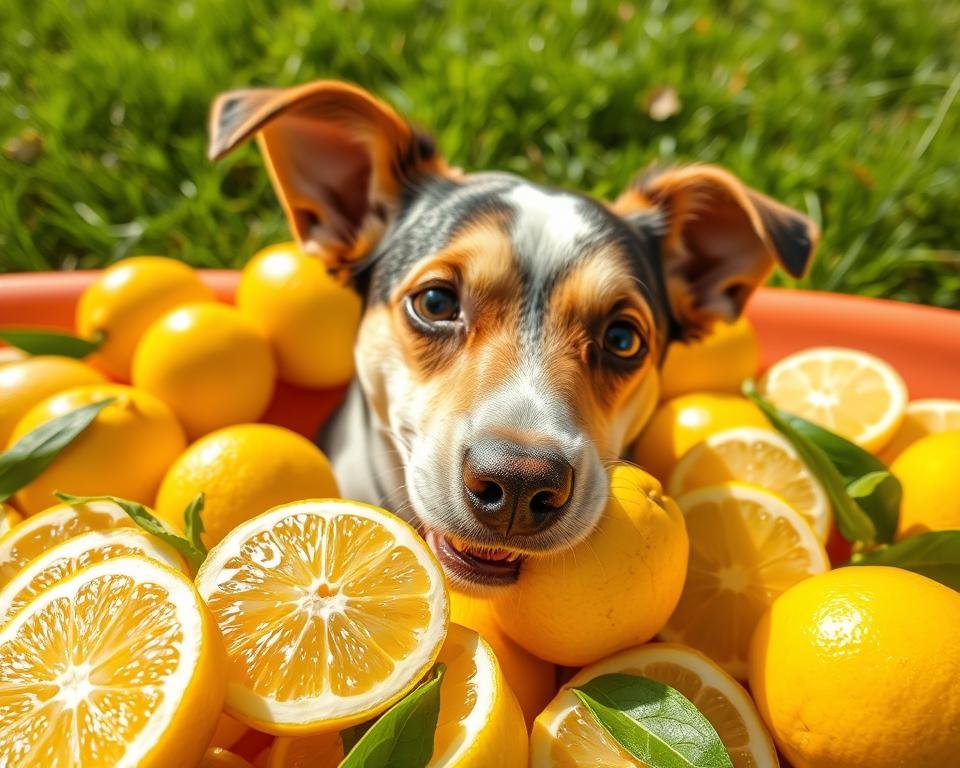Lemons are not toxic to dogs, but they can make them sick. The sour taste of lemons is usually not appealing to dogs. The citric acid and other compounds in lemons can cause digestive problems.
Ingesting a lot of lemon can even lead to serious illness in dogs. As pet owners, we must know the risks. We need to keep our dogs safe from lemons and other citrus fruits.
Lemon flesh is not toxic, but its acidity can upset a dog’s stomach. The lemon peel and rind have psoralen, which is toxic to dogs. It can cause vomiting, diarrhea, lethargy, and skin irritation.
Lemon essential oils are also dangerous if dogs eat them. They can cause liver damage or gastroenteritis.
Understanding Lemon Safety for Dogs
Lemons are not safe for dogs. They contain compounds that can harm dogs if eaten too much. It’s key for pet owners to know what’s in lemons and how dogs react to citrus.
Basic Components of Lemons
Lemons have a lot of citric acid and essential oils. These can upset a dog’s stomach, causing vomiting and diarrhea. The oils, like d-limonene, can be toxic if dogs eat too much.
Natural Dog Reactions to Citrus
Dogs naturally don’t like the smell and taste of lemons. This is because lemons can harm their sensitive stomachs. Dogs usually stay away from lemons and other citrus fruits.
Why Dogs Avoid Lemons Naturally
Lemons also have psoralen, which is toxic to dogs in big amounts. The sour taste and smell, along with the risk of health problems, make lemons bad for dogs.

Even though a little lemon won’t kill dogs, it’s best to keep them away from it. Knowing what’s in lemons and why dogs don’t like them helps keep pets safe and healthy.
Can Dogs Eat Lemons: Health Risks and Concerns
Lemons might seem like a tasty snack, but they’re harmful to dogs. They contain chemicals that are toxic to dogs. This can cause a range of problems.
Symptoms of lemon poisoning in dogs include weakness and confusion. They might also feel drowsy, have diarrhea, and get skin irritation. Other signs are excessive drooling, loss of coordination, tremors, and vomiting.
The citric acid in lemons can upset a dog’s stomach. It can also affect their nervous system. The limonene in citrus fruits can harm a dog’s liver.
Psoralen in lime trees and lemon rinds can make dogs sensitive to sunlight. It can also poison them. Linalool, which gives citrus fruits their scent, can damage a dog’s liver.
Dogs usually don’t like the taste of lemons because they’re bitter. But eating a lot of lemons can make them very sick. They might vomit, have diarrhea, or even choke.
It’s not safe for dogs to eat lemon-flavored foods like cake or lemonade. These foods are too sweet and fatty. Sugar-free desserts with xylitol are also dangerous for dogs.
Even if dogs don’t eat lemons, they can get sick from licking cleaning products with lemon. Lemon rinds can also cause stomach problems in dogs. If a dog eats lemons, they might get dehydrated.
So, it’s best to keep lemons away from dogs. They’re not good for their health.”Lemons are not a safe or recommended food for dogs to consume due to the various health risks associated with their consumption.”
Toxic Components in Lemons
Lemons are a favorite fruit for humans but can be dangerous for dogs. They contain citric acid, psoralen, and essential oils, all of which can harm dogs if eaten.
Citric Acid Effects
The citric acid in lemons can upset a dog’s stomach. It can cause stomach upset, vomiting, and diarrhea. Eating too much lemon juice or pulp can also make dogs weak, confused, and sleepy.
Psoralen in Lemon Peels
Lemon peels have a compound called psoralen, which is toxic to dogs. Eating lemon rinds can block a dog’s stomach and might need surgery to fix.
Essential Oils and Their Dangers
Lemons have essential oils like d-limonene and linalool, which are natural bug killers. But these oils are toxic to dogs if ingested. They can cause skin problems, liver damage, and severe stomach issues like vomiting and diarrhea.
The dangers are higher in lemon juice and essential oils. It’s important to keep lemons and lemon-flavored foods away from dogs.
Pet owners need to know about the dangers of lemons and other citrus fruits. By understanding the toxic components in lemons and their effects, dog owners can keep their pets safe.
Dangers of Lemon Peels and Rinds
Lemons are great for humans but can be harmful to dogs. The peels and rinds have toxic compounds like psoralen. Dogs that eat these parts may vomit, have diarrhea, feel tired, and get skin irritation.
Big pieces of lemon rind can block a dog’s intestines. This is very dangerous. If a dog eats lemon peels or rinds, get vet help right away.
The risks of lemon peels and rinds for dogs are real. Keep lemons away from pets. Be careful when you handle lemons around dogs.
| Lemon Compound | Potential Health Hazard for Dogs |
|---|---|
| Psoralen | Phototoxicity and gastrointestinal irritation |
| Linalool | Toxicity and liver damage |
| Limonene | Vomiting |
| Citric Acid | Stomach lining irritation and central nervous system inflammation |
Knowing about citrus rinds toxicity and lemon peels and dogs helps keep pets safe. It’s important for pet owners to make smart choices for their pets’ health.

Lemon Juice and Your Dog’s Health
Lemons can be risky for dogs, but lemon juice is even more dangerous. It’s packed with concentrated citric acid and other harmful substances. Even a little lemon juice can upset a dog’s stomach.
Concentrated Juice Risks
Lemon juice has much more citric acid than the whole fruit. Dogs can’t handle this acidity well. It can make them vomit, have diarrhea, and feel very sick.
Accidental Exposure Management
If a dog accidentally drinks lemon juice, watch them closely. But if they drink a lot or show signs of being sick, call a vet right away. Keep lemon-flavored foods and drinks away from dogs because they can be harmful.
Lemons and their derivatives should never be intentionally given to dogs, as the risks far outweigh any possible benefits.
“Lemon juice is basically liquid lemon, and the concentrated citric acid can be very harmful to dogs if they eat it.”
Signs of Lemon Poisoning in Dogs
As pet owners, knowing the dangers of common items like lemons is key. Lemon poisoning in dogs can cause mild to severe issues. It’s important to watch for these signs.
The common signs include vomiting, diarrhea, and loss of appetite. Dogs may also feel lethargic or have skin irritation. In severe cases, they might act disoriented, have tremors, or struggle to breathe.
- Vomiting
- Diarrhea
- Loss of appetite
- Lethargy
- Skin irritation
- Disorientation
- Tremors
- Difficulty breathing
- Weakness
If your dog shows these symptoms after eating lemons, get vet help fast. Quick action can prevent serious liver damage or other issues.
Even a little lemon can upset a dog’s stomach. So, it’s best to keep citrus fruits away from them. This way, you can keep your dog safe and healthy.
“Recognizing the signs of lemon poisoning in dogs can be the difference between a minor incident and a life-threatening emergency. It’s always better to err on the side of caution when it comes to our furry friends.”
Safe Fruit Alternatives for Dogs
Lemons and other citrus fruits are bad for dogs. But, there are many tasty and safe fruits for dogs to try. From crunchy apples to juicy berries, these fruits are full of nutrients and antioxidants. They help keep your dog healthy.
Dog-Friendly Fruits List
- Apples (without seeds and core)
- Blueberries
- Strawberries
- Raspberries
- Blackberries
- Cranberries
- Apricots (pits removed)
- Oranges (in moderation)
- Peaches (pits removed)
- Pears
- Mangoes (pits and skin removed)
- Pineapple (flesh only)
- Coconut (meat and oil)
- Kiwi
- Cantaloupe
- Watermelon (without seeds and rind)
Proper Serving Sizes
Start with small amounts of new fruits for your dog. Fruits should not be more than 10% of their daily calories. Talk to your vet to find the right amount for your dog’s size and health.
“Out of the fruits listed as safe for dogs and cats, apples are high in fiber and low in fat, making them an ideal snack for overweight or senior pets.”
While these safe fruits for dogs are good treats, give them in moderation. Don’t give your dog dog-friendly alternatives to lemons that are too sweet or have pits, seeds, or rinds. These can be harmful.
Emergency Response to Lemon Ingestion
If your dog has accidentally eaten a lemon, it’s important to act fast. Lemons have toxic stuff like citric acid and psoralen. These can be very harmful to dogs.
Watch your dog for signs of sickness. Look for vomiting, diarrhea, a lot of drooling, weakness, or trouble walking. These could mean lemon poisoning. Call your vet right away if your dog ate a lot or shows bad symptoms.
- Your vet might tell you to make your dog vomit. This depends on how much lemon they ate and their health. It helps stop the bad stuff from getting in their system.
- Tell your vet how much lemon your dog ate and what part of it. This helps them figure out the best treatment.
- Keep a close eye on your dog and do what your vet says. This might include giving them medicine or extra care.
Acting fast is key, even more so for small dogs or those with health issues. Quick action and vet advice can help a lot. This way, you can make sure your dog is okay after eating a lemon.
| Toxic Compound | Health Risks | Immediate Symptoms | Severe Reactions |
|---|---|---|---|
| Citric Acid | Gastrointestinal irritation | Vomiting, diarrhea | Dehydration, electrolyte imbalance |
| Psoralen | Photosensitivity, skin irritation | Drooling, weakness | Tremors, collapse, possible death |
Remember, emergency response for dogs is key when they eat lemons by accident. Quick action and vet care can keep your dog safe and healthy.
“Psoralen and limonene are identified as the primary toxic compounds in lemons affecting dogs.”
Conclusion
While a little lemon won’t hurt most dogs, keeping citrus fruits away is safer. The dangers of dogs eating lemons, like psoralens and citric acid, are too great. Instead, give your dog a balanced diet and treats like safe fruits like bananas, apples.
If your dog eats lemon by accident, see a vet right away. Watch for signs like skin problems, diarrhea, tiredness, or throwing up. If they have shakes, seem confused, or can’t move well, get help fast.
Knowing the risks of dogs eating lemons helps keep them safe. A good diet keeps your dog happy and healthy. This guide helps you make smart food choices for your dog and avoid lemon problems.
FAQ
Can dogs have lemon?
No, dogs should not eat lemons or lemon juice. It can make them sick. The sour taste is unappealing to most dogs.
Lemon flesh isn’t toxic, but it can cause digestive issues. Lemon peels contain toxic chemicals that are harmful to dogs.Are lemons harmful to dogs?
Yes, lemons can be harmful to dogs. They contain citric acid and essential oils that can be toxic. Ingestion may lead to digestive upset.
This includes vomiting and diarrhea. The high acidity can irritate a dog’s digestive system.Can dogs eat lemon peels?
No, lemon peels and rinds are dangerous for dogs. They contain toxic compounds like psoralen. Ingestion can lead to vomiting, diarrhea, and lethargy.
It can also cause skin irritation. Large pieces of rind can cause intestinal blockages, a potentially life-threatening condition.Can dogs have lemon water?
No, dogs should not have lemon water. Lemon juice is more concentrated and dangerous. Even small amounts can cause significant digestive upset.
Lemon-flavored foods and drinks should also be kept away from dogs. They contain concentrated harmful ingredients like sugar.What are the signs of lemon poisoning in dogs?
Symptoms of lemon poisoning in dogs include vomiting and diarrhea. They may also lose their appetite, feel lethargic, and have skin irritation.
In severe cases, dogs may experience disorientation, tremors, difficulty breathing, or weakness. These signs can indicate liver damage or severe digestive distress.What fruits are safe for dogs to eat instead of lemons?
Dogs can safely enjoy fruits like apples (without seeds and core), blueberries, and strawberries in moderation. These fruits provide vitamins and antioxidants that are beneficial to dogs.
Oranges, tangerines, and clementines are safe in small amounts of citrus.What should I do if my dog eats a lemon?
If a dog consumes lemon, monitor them closely for signs of illness. Contact a veterinarian immediately, if large amounts were ingested or if the dog shows poisoning symptoms.
The vet may recommend inducing vomiting. This depends on the amount consumed and the dog’s overall health.



